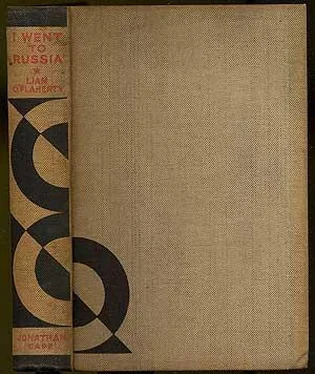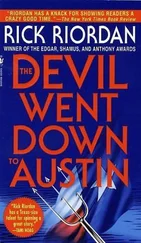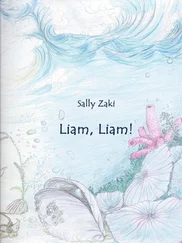Liam O'Flaherty - I Went to Russia
Здесь есть возможность читать онлайн «Liam O'Flaherty - I Went to Russia» весь текст электронной книги совершенно бесплатно (целиком полную версию без сокращений). В некоторых случаях можно слушать аудио, скачать через торрент в формате fb2 и присутствует краткое содержание. Город: London, Год выпуска: 2011, ISBN: 2011, Издательство: Bloomsbury Publishing, Жанр: Публицистика, на английском языке. Описание произведения, (предисловие) а так же отзывы посетителей доступны на портале библиотеки ЛибКат.
- Название:I Went to Russia
- Автор:
- Издательство:Bloomsbury Publishing
- Жанр:
- Год:2011
- Город:London
- ISBN:9781448205592
- Рейтинг книги:5 / 5. Голосов: 1
-
Избранное:Добавить в избранное
- Отзывы:
-
Ваша оценка:
- 100
- 1
- 2
- 3
- 4
- 5
I Went to Russia: краткое содержание, описание и аннотация
Предлагаем к чтению аннотацию, описание, краткое содержание или предисловие (зависит от того, что написал сам автор книги «I Went to Russia»). Если вы не нашли необходимую информацию о книге — напишите в комментариях, мы постараемся отыскать её.
I Went to Russia — читать онлайн бесплатно полную книгу (весь текст) целиком
Ниже представлен текст книги, разбитый по страницам. Система сохранения места последней прочитанной страницы, позволяет с удобством читать онлайн бесплатно книгу «I Went to Russia», без необходимости каждый раз заново искать на чём Вы остановились. Поставьте закладку, и сможете в любой момент перейти на страницу, на которой закончили чтение.
Интервал:
Закладка:
In order to explain the situation to me, I was told that the Bureau had telegraphed to various prominent writers in Western Europe asking similar questions. George Bernard Shaw, when asked what would be his position, telegraphed in reply, ‘The hanging position.’
‘This is a nice how d’ye do,’ I said to myself. ‘God bless the Jesuits.’
For, upon my honour, I have no intention whatsoever of taking part in any war, great or small, in future, unless it be of my own making. I have had enough of war. I loathe war. I consider it a stupid, ungainly and unpleasant business, concerned with hunger, thirst, wet feet, lack of sleep, too much noise, disease, lice, wounds and horrible death. As far as I am concerned, war to end capitalism is war and unpleasant, just as much as the war in which I participated, which was the war to end war. The only people who want war are those who have no intention of taking part in war, people who are protected by their sex or their infirmities or their age or their position in society from ever toting a gun or a pack or a sheepskin. I, on the other hand, am like the wretched fellow whom I saw standing on the brink of the pier at Leningrad, a muit to whom somebody gives a gun and a pat on the back and sends the blighter shuddering but gallant to Hell. Bo! Bo! Catch me at it again. Shaw is too old to fight and I hope he enjoys being hanged; but if there is a cave anywhere, deep enough to withstand air bombs, I’m for it in case of hostilities.
I looked slyly around the room at the revolutionary writers of Moscow and saw that they were all intelligent above the ordinary, not the sort of people one would be likely to find up to their necks in mud and water on a night of heavy bombardment. Indeed, it was easy to see that they all belonged with one or two exceptions to the race that is chosen, for the last two thousand years, for commerce but not for war.
‘Why pick on me?’ I thought. ‘My teeth are bad and my liver is diseased. But still. ... I have only eight roubles and I’m far from home.’
So I wrote, God forgive me, having no intention of ever again firing a shot at anybody but my creditors:
‘Should capitalist Europe declare war on the Soviet Union, I’ll make war on capitalist Europe with every means in my power.’
This warlike statement was received with deafening applause and I grew rather sorry I was not of the stuff with which they make heroes. But in any case, my answer served its immediate purpose. The cashier at once paid me for a story which had been printed in the Bureau’s magazine five years previously. I was informed that on the following day the State Publishing House would pay me a thousand roubles on account of royalties due to me. Arrangements were made for getting me a room and I was given a guide to attend to all my wants and comforts.
I do not wish to infer that I would have been treated with discourtesy had I told the truth, that I would not have been paid my royalties and that I would have been left without a room or a guide. I merely want to point out how ungainly is the Russian method of greasing the palms of writers compared to the methods in vogue in capitalist countries, especially in England. The Russian method rather resembles the French method, where journalists are almost openly and in public subsidised by the government. In England recalcitrant writers are gently allowed to starve, unless they bow their heads to the British gods of good form and imperial expediency. It is much more subtle, the British method, and it does not leave such a bad taste in the mouths of sensitive persons; although it certainly leaves an extreme emptiness in the stomachs of persons who are too sensitive to be bought.
In the same manner, the whole Bureau of Revolutionary Literature appeared to me a crude and ungainly affair. Under the direction of the Russian Communist Party (the Keepers of the Word, the Communist Hierarchy), this organization aimed at uniting the principal writers of the world under its control, for the purpose of demoralizing capitalism and encouraging the working class of the world to make war on their oppressors. A perfectly laudable and admirable scheme, were it possible or intelligently carried out. But writers, especially creative writers, are curious individuals. They dislike any form of control and are continually at war with their wives, who try to keep them sober, tidy and industrious, with their publishers, who try to rob them, with their editors, who try to curb their passion for obscenity, and with the philistine public, which tries to censor their passion for life. When cthe situation is such’ in Western Europe, where a dying civilization grants liberal privileges to men of talent, how much more difficult must it be to govern men who are by nature anarchists, jealous of governance, by the rules of a community where a nascent civilization is being created in territories inhabited by people who are almost savage and therefore alien to liberal principles? In such a nascent civilization a strict censorship of conduct is necessary as well as a violent personal dictatorship. The citizens are for the most part peasants and submit peaceably to dictatorship, being ignorant of that development of personal initiative which breeds anarchy. Now the fault of the Russian Bureau of Revolutionary Literature is that it tries to govern civilised Europeans on the same principle that it governs uncivilised Russians; it tries to treat Europeans as if they were naive children like the Russians; which is impossible.
In any case, the Bureau was manned almost entirely by Jews and that race is notoriously dogmatic and fanatical. An organisation governed entirely by Jews is sure to be full of sound and fury, unless it has to deal entirely with Jews who love sound and fury. And Jews have never been able to understand the creative passion. No doubt they have given great artists to the world, but as a rule, Jewish men of genius are critics like Marx and fanatics like Jesus Christ rather than poets like Shakespeare. They prefer to push their genius down throats with violence and bitterness rather than let it enter passionately through the pores into the blood, in the intoxicating manner preferred by less intense races.
Jews analyse life. They document. They catalogue. They treat life as if it were a warehouse, stocked with goods for sale. They are bitten by the gad-fly of hysteria, whose poison they seek to eject from their system by continual appeals to one god after another; and in despair at the failure of their gods to cure them, they reject their gods almost as soon as they have created them. Whereas the lazy gentiles worship beauty for her own sake and are loath to dissect her and hold up her entrails to the microscope.
So here was this Bureau of Revolutionary Literature in Moscow, trying to harness literature to the wheels of Communism and trying to enrol me as one of its progandists. I said nothing against the idea. What the devil had it got to do with me? You can put a uniform on anybody but you cannot make him march unless his brain wills to move his feet.
I was put in charge of a comrade, who spoke English very well. He was a very charming fellow, very intense and very enthusiastic, eminently learned in literature, master of some six or seven languages, an ardent communist, twenty-five years of age, Levit by name. He at once proceeded to explain to me the construction and objective of the Bureau. He was slim and tall. He had a pale, intellectual countenance and he wore pince-nez, and spoke as if he were at the telephone trying to explain to a police-sergeant that his house had just been robbed.
‘Comrade,’ he said, ‘the situation is such. This Bureau is such a place. It is the centre of a world organisation to co-ordinate the activities of proletarian writers. This is the foreign section of the Bureau. We have centres, similar to this, in Tchecho-Slovakia, Germany, France and in many other countries. All foreign writers coming into Russia come to us and we give them information, and guidance, except such as are entirely bourgeois, which go to the society for cultural relations. Such people, which we cannot very well forbid to come, are nevertheless brought around by that other society, so that they may see what is best and be unable to tell too many lies.’
Читать дальшеИнтервал:
Закладка:
Похожие книги на «I Went to Russia»
Представляем Вашему вниманию похожие книги на «I Went to Russia» списком для выбора. Мы отобрали схожую по названию и смыслу литературу в надежде предоставить читателям больше вариантов отыскать новые, интересные, ещё непрочитанные произведения.
Обсуждение, отзывы о книге «I Went to Russia» и просто собственные мнения читателей. Оставьте ваши комментарии, напишите, что Вы думаете о произведении, его смысле или главных героях. Укажите что конкретно понравилось, а что нет, и почему Вы так считаете.












